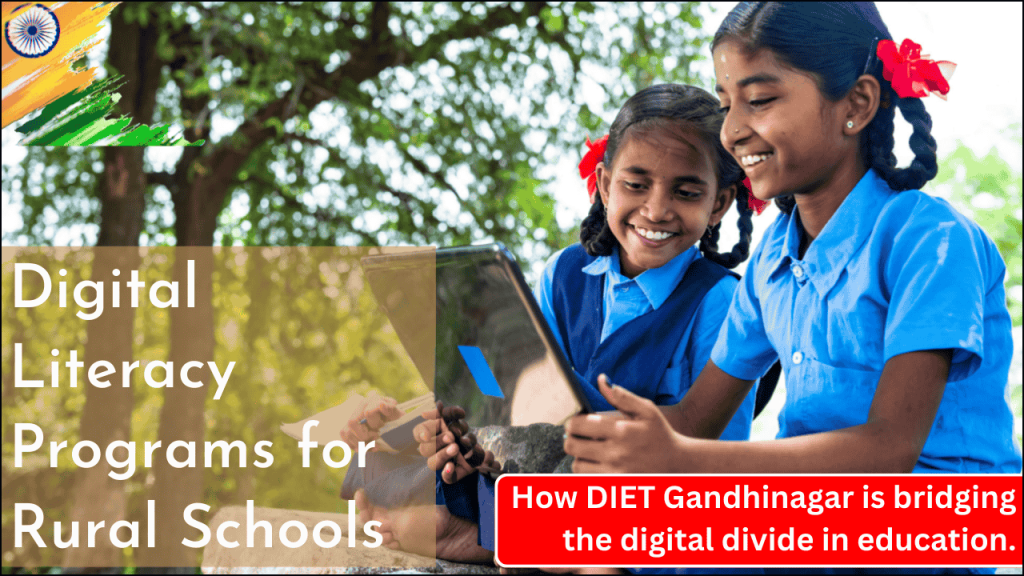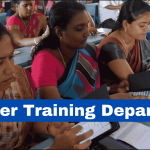
Digital literacy is essential for education in the modern world. Many rural schools lack access to technology and digital education. DIET Gandhinagar is making efforts to improve digital literacy in rural areas. Various programs have been launched to train teachers and students in digital skills. The initiative aims to reduce the digital divide and ensure equal learning opportunities.
Importance of Digital Literacy in Rural Education
- Digital literacy helps students gain knowledge beyond textbooks.
- Online resources provide interactive learning experiences.
- Technology enhances teaching methods and makes learning engaging.
- Digital skills prepare students for future careers.
- A lack of digital literacy can create inequalities in education and employment.
Challenges in Rural Schools
- Limited access to computers and the internet.
- Lack of trained teachers for digital education.
- Poor infrastructure and unreliable electricity supply.
- Financial constraints are preventing schools from investing in technology.
- Resistance to change due to traditional teaching methods.
DIET Gandhinagar’s Role in Digital Literacy
- DIET (District Institute of Education and Training), Gandhinagar, is dedicated to improving education.
- Digital literacy programs are introduced to empower rural students and teachers.
- Collaboration with government and private organizations helps in funding and training.
- Special workshops are conducted to teach basic computer skills.
- The goal is to create a technology-friendly environment in rural schools.
Digital Literacy Programs by DIET Gandhinagar
1. Basic Computer Training for Teachers
- Training sessions teach teachers how to use computers and the internet.
- Online teaching methods are introduced.
- Teachers learn to create digital content for classrooms.
- Assessment techniques using digital tools are taught.
2. Student Digital Awareness Programs
- Students are introduced to basic computing skills.
- Learning modules include MS Office, internet browsing, and digital safety.
- Interactive sessions help students understand the importance of digital literacy.
- Special classes are held for students with no prior computer knowledge.
3. Smart Classroom Initiatives
- Traditional classrooms are upgraded with digital boards and projectors.
- Audio-visual content enhances understanding.
- Teachers receive support in using smart classroom tools.
- Students benefit from engaging and interactive lessons.
4. Internet Connectivity Solutions
- DIET Gandhinagar collaborates with telecom providers to improve internet access.
- Rural schools receive financial assistance for internet facilities.
- Free Wi-Fi zones are set up in selected schools.
- Digital libraries are created for easy access to educational resources.
5. E-learning and Online Courses
- Free online courses are being introduced for students.
- Recorded lectures help students learn at their own pace.
- Digital literacy certification programs encourage student participation.
- Government portals like Diksha and SWAYAM are promoted for self-learning.
Digital Literacy Impact in Rural Schools
The below table shows the before and after impact of DIET programs in education system.
| Aspect | Before DIET Programs | After DIET Programs |
|---|---|---|
| Computer Access | Very Limited | Available in most schools |
| Teacher Training | Minimal | Regular workshops held |
| Student Knowledge | Basic or None | Improved digital skills |
| Internet Usage | Rare | Common in learning |
| Smart Classrooms | Absent | Implemented in several schools |
Success Stories
- Several rural schools have shown remarkable improvement in digital literacy.
- Teachers report higher student engagement with digital tools.
- Students gain confidence in using technology for learning.
- Schools adopting digital programs witness better academic performance.
- Community awareness about digital education has increased.
Future Plans
- Expansion of digital literacy programs to more villages.
- Advanced training for teachers on AI and coding.
- Partnerships with tech companies for better resources.
- Mobile digital education units for remote areas.
- Government support to increase funding and infrastructure.
End Notes
Digital literacy is crucial for rural education development. DIET Gandhinagar is playing a vital role in bridging the digital divide. Programs focusing on teachers and students are transforming learning experiences. Continued efforts will ensure that rural students have equal opportunities in the digital world. Collaboration between government, educators, and communities is essential for success.









